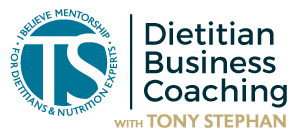Have you ever experienced feelings of doubt or phoniness? Or maybe you’ve felt unworthy of your success or accomplishments, regardless of how big or small they were. Well, that’s called imposter syndrome. First things first: this is not uncommon. It’s especially common among individuals with perfectionist “type A” personalities who often compare themselves to others. But before we dive a little deeper into ways you can overcome imposter syndrome, allow me to introduce myself!
My name is Tony Stephan, and I’m a dietitian business coach. I help RDs make more IMPACT and more INCOME through nutrition coaching. However, before becoming a dietitian business coach, I was an RD nutrition coach. I served thousands of nutrition coaching clients over a time span of 12 years. My successful nutrition coaching business is what led me to where I am today. Now, let’s dive into imposter syndrome as a dietitian nutrition coach and discuss ways YOU can overcome it.
What Is Imposter Syndrome?
Imposter syndrome isn’t a diagnosis or a disorder. It’s simply a thought pattern that leads you to believe you aren’t good enough, worthy enough, smart enough, etc. Most people report feeling this way at some point in their lives. It can manifest itself in many different areas, such as: home, work, parenthood, dating/marriage, and other relationships.
With imposter syndrome, the more success you have, the more self doubt and anxiety you feel. You feel as if you aren’t able to live up to the expectations you’ve created for yourself. You feel as if the success you’ve experienced has not truly been earned. So what can you do to feel as if you are deserving, and celebrate your accomplishments, rather than downplay and ignore them?
4 Ways To Overcome Imposter Syndrome
Aim For Progress, Not Perfection
Imposter syndrome is common among high achievers and perfectionists. Perfectionism often feeds imposter syndrome. Unfortunately, holding yourself to very high standards can be counterproductive to making any real progress at all. While striving for perfection may seem like a noble goal at first, it is unrealistic for the long-term. The truth is: no one can do everything perfectly. There is no such thing as taking perfect action at the perfect time. If you aim for consistently taking imperfect action, you will reach your goals much faster!
Own Your Success
It’s normal for high achievers and perfectionist types to attribute their success to luck or other external factors. This would be in contrast to the actual hard work, determination, and skill it actually required. To combat this, it can be helpful to keep track of your accomplishments along the way! If you haven’t been doing this, think back over the past 6 to 12 months and write down where you were then vs where you are now.
You definitely didn’t get to this point by chance or luck! Whenever you feel doubt creeping back in, reflect back on the success you’ve already had.
Stop Comparing Yourself To Others
Theodore Roosevelt is often quoted saying, “Comparison is the thief of joy.” With RD entrepreneurship it’s important to fully accept that your journey is your own. No two paths will ever be the same! Comparison can be useful, but with regard to imposter syndrome it often leaves us feeling less joy because we think we have to be exactly where someone else is/was.
Focus on improving yourself and celebrating your own achievements and milestones versus measuring them up against others. One way to help reduce comparison is to unfollow social media accounts that may be toxic to your own mindset. And remind yourself that social media is just a small glimpse into the lives of others.
Talk It Out
Talk about it with someone you trust. Maybe that is a friend, colleague, mentor, or pastor. This will help get things off your chest! Ultimately, the people you trust would help you separate reality from the false thoughts swirling around your own head. They can help you recognize the normalcy of imposter syndrome and help you realize how irrational some of your thoughts may be.
Consider talking with a therapist or licensed professional counselor. They can really help you recognize your thoughts/feelings and help you come up with coping strategies specific to your needs! Having the skills to stop and reframe negative thoughts into neutral or more positive thoughts is extremely useful.
The Takeaway Message
Imposter syndrome happens often among high-performing individuals with perfectionist tendencies. You are not alone! Those feelings of doubt, fraud, and failure can sometimes be paralyzing. However, if you improve your level of self-awareness and implement the strategies discussed above, you can move forward and avoid getting stuck in the imposter syndrome cycle.
If you’re a dietitian looking to start your own nutrition coaching side hustle or build a thriving 6-figure business, you’ve come to the right place. I’m proud to be a part of the movement of dietitian entrepreneurs who are making more IMPACT and more INCOME!





